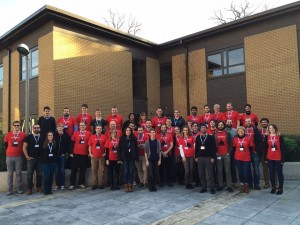
This year is International Map Year [1], a worldwide celebration of maps and their unique role in our world. It’s organized by the International Cartographic Association (ICA) and supported by the United Nations (UN).
To celebrate this year, ICA Commissions are preparing a series of activities to demonstrate the ability of Cartography helping to solve global issues, accordingly to the UN Sustainable Development Goals [2]
The result of this will be a poster exposition and an Atlas published by ICA. Each goal (there are 17) will have one poster. The Open Source Geotechnologies Commission got the Goal number 10 (“Reduce inequality within and among countries”). Under this goal, there are 7 targets detailed in page 21 of this document [3].
UN Sustainable Development Goal 10 – Reduce inequality within and among countries
10.1 By 2030, progressively achieve and sustain income growth of the bottom 40 per cent of the population at a rate higher than the national average
10.2 By 2030, empower and promote the social, economic and political inclusion of all, irrespective of age, sex, disability, race, ethnicity, origin, religion or economic or other status
10.3 Ensure equal opportunity and reduce inequalities of outcome, including by eliminating discriminatory laws, policies and practices and promoting appropriate legislation, policies and action in this regard
10.4 Adopt policies, especially fiscal, wage and social protection policies, and progressively achieve greater equality
10.5 Improve the regulation and monitoring of global financial markets and institutions and strengthen the implementation of such regulations
10.6 Ensure enhanced representation and voice for developing countries in decision-making in global international economic and financial institutions in order to deliver more effective, credible, accountable and legitimate institutions
10.7 Facilitate orderly, safe, regular and responsible migration and mobility of people, including through the implementation of planned and well-managed migration policies
10.a Implement the principle of special and differential treatment for developing countries, in particular least developed countries,in accordance with World Trade Organization agreements
10.b Encourage official development assistance and financial flows, including foreign direct investment, to States where the needis greatest, in particular least developed countries, African countries, small island developing States and landlocked developing countries, in accordance withtheir national plans and programmes
10.c By 2030, reduce to less than 3 per cent the transaction costs of migrant remittances and eliminate remittance corridors withcosts higher than 5 percent
This challenge is a call for all Geo4labs for inputs to construct this poster in an open and collaborative way. The idea is to expand the poster to a website, where projects, applications, and other solutions could be shared. This is a great opportunity to showcase the labs outcomes in the UN environment in this very sensitive and important global issue. Any other ideas on this project are welcome!
How to participate:
- Send and abstract from 500 to 1000 words include as many pictures of classes, projects, field works, mapathons, and, of course, maps and map interfaces.
- Optional: Video with up to 5 minutes presenting your lab activities.
- Send the results to geo4all.cartographicchallenge@gmail.com until March 31st, 2016.
During the month of April, the posters layout ideas will be open to vote and collaboration.
Outputs :
- Poster and ICA Atlas
- Website with results and edited video
- Publication of the abstracts with ISBN
[1] http://mapyear.org//
[2] https://sustainabledevelopment.un.org/
[3] http://www.un.org/ga/search/view_doc.asp?symbol=A/RES/70/1&Lang=E

